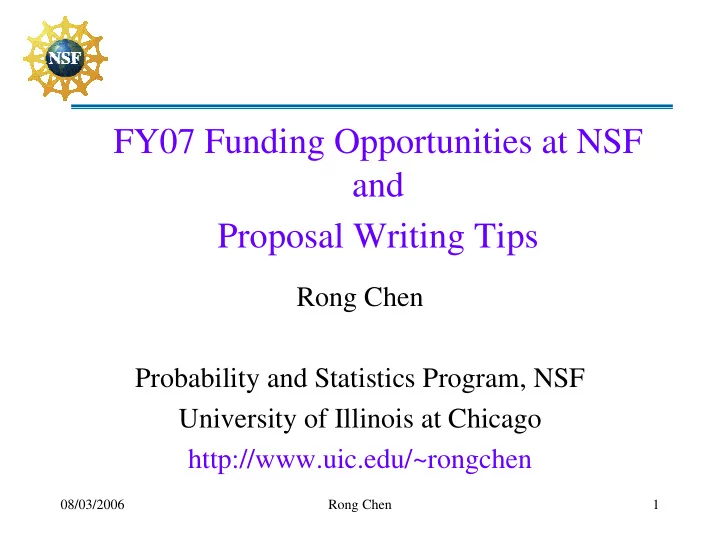

FY07 Funding Opportunities at NSF and Proposal Writing Tips Rong Chen Probability and Statistics Program, NSF University of Illinois at Chicago http://www.uic.edu/~rongchen 08/03/2006 Rong Chen 1
Math Sciences Priority Area (MSPA) • Much of the MSPA funds are earmarked for inter- disciplinary research • Includes joint funding opportunities with every NSF research directorate: BIO, CISE, ENG, SBE, GEO, OPP, MPS (PHY,CHM,AST,DMR) • Division-wide competition • Usually large grants, with post-doc and graduate student support • MSPA is winding down. Half-strength in FY07. • Only some programs will continue after FY07. 08/03/2006 Rong Chen 2
DMS/NIGMS in Math Biology • Collaboration: DMS and NIH/NIGMS • Research in math/stat related to biology of interest to NIH/NIGMS (not specific disease) • New solicitation and deadline are forthcoming • Deadline (please check often) • Team? Expected, not required • Will continue 08/03/2006 Rong Chen 3
Math-Geo Collaboration (CMG) • Collaborative research at the intersection of Math/Stat and Geosciences • New solicitation will be out soon • Deadline: Feb 1, 2007 • Budget: TBD • Team? Required • Expect to continue at least until FY09 08/03/2006 Rong Chen 4
Focused Research Group (FRG) • Focused Research Groups in the Mathematical Sciences • Group (at least 3) of researchers all working on the same focused problem • May be team of all math scientists or team of math scientists and others • Projects where collective effort is necessary and a breakthrough might be expected 08/03/2006 Rong Chen 5
• Letter of intent 3 rd Friday in August. Proposal 3 rd Friday in Sept. • Total budget: TBD (about $9M) • Award size: up to $500K per year • Prestigious awards • Expected number of awards: TBD (about 10-12). • Division-wide competition 08/03/2006 Rong Chen 6
Research and Training Groups (RTG) • One of the workforce programs • A group of researchers in the same department • Based in a sub-area of the mathematical sciences or linked by a multidisciplinary theme • Supports training at educational levels from undergraduate to postdoctoral within that focus. 08/03/2006 Rong Chen 7
Career Program • Goal: Encourage young investigators to develop a research and teaching-oriented career in academia • 5-year $400K awards. • Very competitive and prestigious 08/03/2006 Rong Chen 8
• PI must be a PhD, untenured, in a tenure- track position; no previous career award. • Integrate research and education. • International dimensions encouraged • Research partners cannot be co-PI’s Note: • Start early (don’t wait until your 5-th year) • Same proposal can be sent to the regular program with some modification. 08/03/2006 Rong Chen 9
Regular Statistics Program • # Proposals ~140 (2005) ~150 (2006) • # Awards ~55 (2005) ~57 (2006) • #Awards (younger than1997 PhD): 22 (2005) #Awards (younger than 1998 PhD): 18 (2006) Note: The Probability program is about half the size 08/03/2006 Rong Chen 10
Important Changes • Submission window: Oct 23 – Nov 7. • Proposal will be returned without review if received after Nov 7. • Full panel review • Only a small number of proposals will be mail reviewed 08/03/2006 Rong Chen 11
Warning: grants.gov is coming • May be enforced for all FY07 proposals • Your SRO may not be experienced • Start as early as possible • Treat Oct 23 as your deadline so you will have two weeks to work with grants.gov • Do not wait until the last minute! 08/03/2006 Rong Chen 12
Tips – write to the panelists • What: interesting, exciting -- feel good • Why: important, motivated -- feel justified • When: timeliness -- can’t wait • Why Me: prior support, track record, preliminary results -- this is the guy! • How: details, details, details … -- understand and be able to evaluate • Read the solicitation carefully and follow it to the letter. -- We do check compliances 08/03/2006 Rong Chen 13
Don’t • Don’t use small fonts or narrow margins • Don’t use less than 15 pages • Don’t jam in too many ideas or projects • Don’t ask for too much, nor too little • Don’t have typos • Don’t be discouraged if you fail for a couple of times. Keep trying … 08/03/2006 Rong Chen 14
Broader Impact • At least half page • Societal impact • Education: course development • Training: Graduate and undergraduate, minority and female students • Dissemination: publication, talk, making software available to public, (e.g. R code) • Be creative 08/03/2006 Rong Chen 15
Information Visit NSF/DMS website for more detailed and updated information and programs and solicitations not mentioned here. http://www.nsf.gov/div/index.jsp?div=DMS 08/03/2006 Rong Chen 16
Happy Writing and Good Luck Don’t blame me if you don’t get it (We just don’t have enough money to fund all the proposals that are worth funding) 08/03/2006 Rong Chen 17
Recommend
More recommend